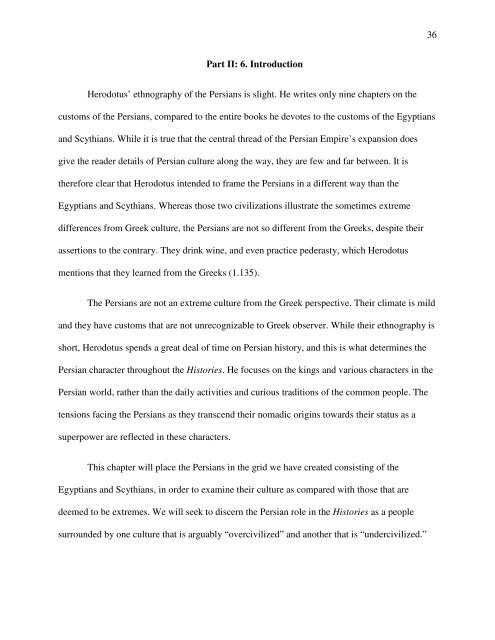The Old and the Restless - The Egyptians and the Scythians in Herodotus' Histories by Robert J. Hagan
You also want an ePaper? Increase the reach of your titles
YUMPU automatically turns print PDFs into web optimized ePapers that Google loves.
36<br />
Part II: 6. Introduction<br />
Herodotus’ ethnography of <strong>the</strong> Persians is slight. He writes only n<strong>in</strong>e chapters on <strong>the</strong><br />
customs of <strong>the</strong> Persians, compared to <strong>the</strong> entire books he devotes to <strong>the</strong> customs of <strong>the</strong> <strong>Egyptians</strong><br />
<strong>and</strong> <strong>Scythians</strong>. While it is true that <strong>the</strong> central thread of <strong>the</strong> Persian Empire’s expansion does<br />
give <strong>the</strong> reader details of Persian culture along <strong>the</strong> way, <strong>the</strong>y are few <strong>and</strong> far between. It is<br />
<strong>the</strong>refore clear that Herodotus <strong>in</strong>tended to frame <strong>the</strong> Persians <strong>in</strong> a different way than <strong>the</strong><br />
<strong>Egyptians</strong> <strong>and</strong> <strong>Scythians</strong>. Whereas those two civilizations illustrate <strong>the</strong> sometimes extreme<br />
differences from Greek culture, <strong>the</strong> Persians are not so different from <strong>the</strong> Greeks, despite <strong>the</strong>ir<br />
assertions to <strong>the</strong> contrary. <strong>The</strong>y dr<strong>in</strong>k w<strong>in</strong>e, <strong>and</strong> even practice pederasty, which Herodotus<br />
mentions that <strong>the</strong>y learned from <strong>the</strong> Greeks (1.135).<br />
<strong>The</strong> Persians are not an extreme culture from <strong>the</strong> Greek perspective. <strong>The</strong>ir climate is mild<br />
<strong>and</strong> <strong>the</strong>y have customs that are not unrecognizable to Greek observer. While <strong>the</strong>ir ethnography is<br />
short, Herodotus spends a great deal of time on Persian history, <strong>and</strong> this is what determ<strong>in</strong>es <strong>the</strong><br />
Persian character throughout <strong>the</strong> <strong>Histories</strong>. He focuses on <strong>the</strong> k<strong>in</strong>gs <strong>and</strong> various characters <strong>in</strong> <strong>the</strong><br />
Persian world, ra<strong>the</strong>r than <strong>the</strong> daily activities <strong>and</strong> curious traditions of <strong>the</strong> common people. <strong>The</strong><br />
tensions fac<strong>in</strong>g <strong>the</strong> Persians as <strong>the</strong>y transcend <strong>the</strong>ir nomadic orig<strong>in</strong>s towards <strong>the</strong>ir status as a<br />
superpower are reflected <strong>in</strong> <strong>the</strong>se characters.<br />
This chapter will place <strong>the</strong> Persians <strong>in</strong> <strong>the</strong> grid we have created consist<strong>in</strong>g of <strong>the</strong><br />
<strong>Egyptians</strong> <strong>and</strong> <strong>Scythians</strong>, <strong>in</strong> order to exam<strong>in</strong>e <strong>the</strong>ir culture as compared with those that are<br />
deemed to be extremes. We will seek to discern <strong>the</strong> Persian role <strong>in</strong> <strong>the</strong> <strong>Histories</strong> as a people<br />
surrounded <strong>by</strong> one culture that is arguably “overcivilized” <strong>and</strong> ano<strong>the</strong>r that is “undercivilized.”
















